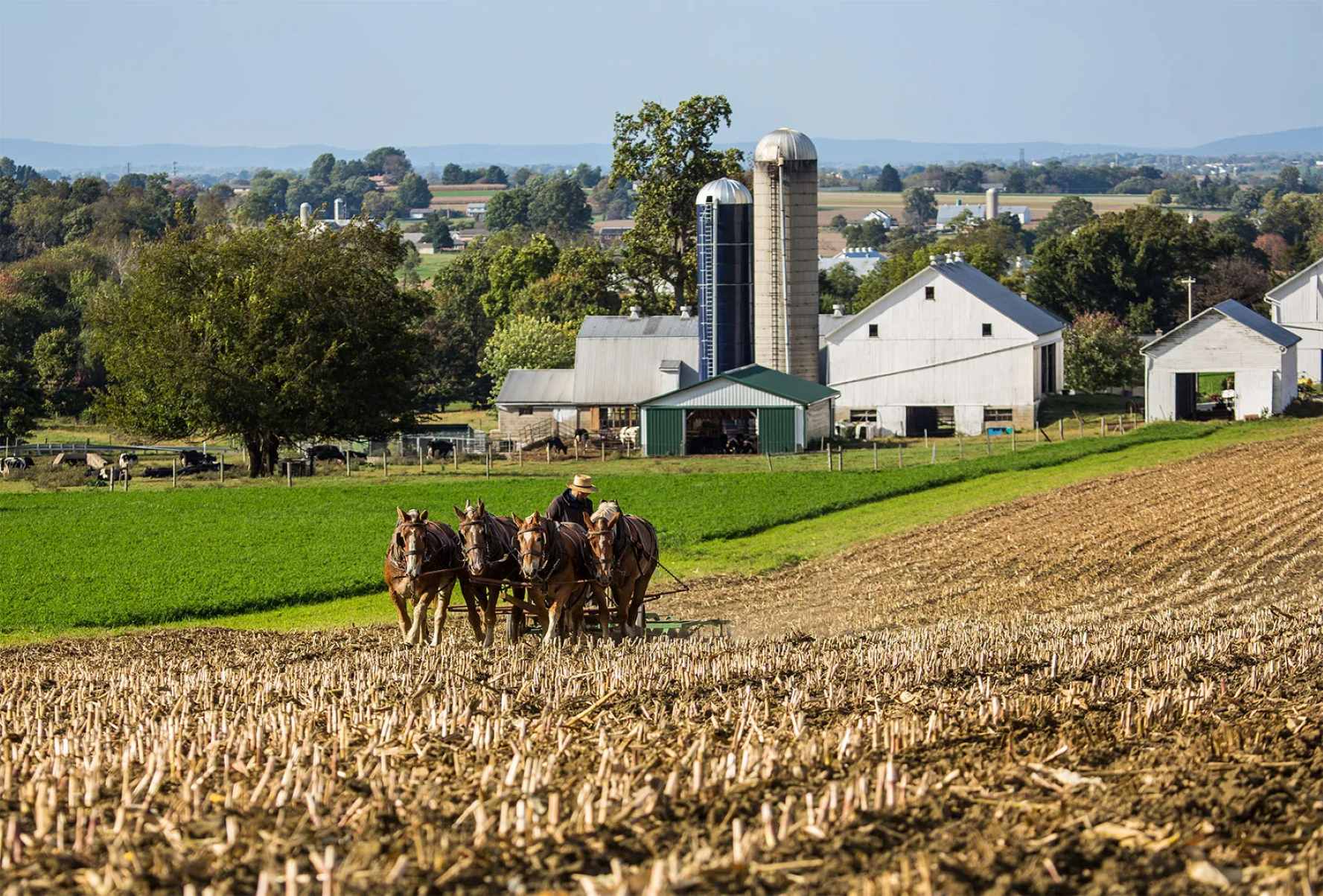
When it comes to agriculture, Pennsylvania has a rich history and a vibrant present. This diverse state is known not only for its beautiful landscapes but also for its thriving agricultural industry. From the rolling hills of Lancaster County to the fertile fields of the Susquehanna Valley, Pennsylvania is home to a wide range of agricultural practices and products.
As we delve into the fascinating world of Pennsylvania agriculture, we will uncover 10 interesting facts that showcase the impressive scope and significance of this industry in the Keystone State. Whether you’re a local resident, a curious traveler, or simply an enthusiast for all things agriculture, these facts will provide you with a deeper understanding and appreciation for the agricultural tapestry that makes Pennsylvania unique.
Key Takeaways:
- Pennsylvania’s agriculture has a rich history and diverse products, from dairy and mushrooms to apples and wine, showcasing the hard work and dedication of its farmers.
- The state is a leader in sustainable farming practices, providing employment opportunities and ensuring food safety and quality for consumers.
Pennsylvania is known for its rich farming history.
The state of Pennsylvania has a long and proud tradition of agriculture, with farming playing a vital role in its economy and culture. From the early settlers who cleared the land and planted crops to the modern-day farmers using innovative techniques, agriculture has shaped the landscape of the Keystone State.
The dairy industry is a significant contributor to Pennsylvania’s agriculture sector.
Pennsylvania ranks among the top dairy-producing states in the United States. With a vast number of dairy farms, the state is renowned for its high-quality milk, cheese, and other dairy products. The dairy industry not only supports the livelihoods of many farmers but also provides consumers with delicious and nutritious options.
Pennsylvania is a leading producer of mushrooms.
The state’s climate and ideal growing conditions make it an excellent location for mushroom cultivation. Pennsylvania produces a significant portion of the country’s mushrooms, supplying fresh and processed mushrooms to both domestic and international markets. From button mushrooms to gourmet varieties, Pennsylvania mushrooms are renowned for their quality and flavor.
Pennsylvania is famous for its apple orchards and apple products.
With a wide variety of apple orchards spread across the state, Pennsylvania is a haven for apple lovers. The state produces a diverse range of apple varieties, including popular ones like Granny Smith, Golden Delicious, and McIntosh. Visitors flock to Pennsylvania’s orchards in the fall to experience the joy of apple picking and enjoy fresh apple cider, apple pies, and other delicious apple-based treats.
Pennsylvania is home to thriving vineyards and wineries.
The state’s temperate climate and unique microclimates provide ideal conditions for grape cultivation. Pennsylvania boasts numerous vineyards and wineries, producing a wide selection of wines, from classic reds and whites to unique blends and specialty fruit wines. Tourists and wine enthusiasts can explore the picturesque vineyards and indulge in wine tastings and vineyard tours.
Pennsylvania is a major producer of corn and soybeans.
The fertile soil and favorable growing conditions make Pennsylvania a significant producer of corn and soybeans. These crops play a crucial role in the state’s livestock industry, providing feed for dairy cows, poultry, and livestock. Pennsylvania farmers employ advanced farming techniques to increase efficiency and yield while maintaining sustainable agricultural practices.
Pennsylvania has a thriving farmer’s market scene.
Throughout the state, local farmer’s markets are a hub of activity, offering a wide array of fresh produce, meats, dairy products, baked goods, and artisanal crafts. These markets provide an opportunity for farmers to sell their products directly to consumers, fostering a sense of community and supporting the local economy.
Pennsylvania is at the forefront of sustainable agriculture practices.
The state is a leader in promoting sustainable farming practices that prioritize environmental stewardship and conservation. Pennsylvania farmers are implementing innovative techniques like cover cropping, precision agriculture, and sustainable water management to enhance productivity while minimizing their environmental impact.
Pennsylvania’s agriculture sector is a major employer.
Agriculture provides employment opportunities for thousands of Pennsylvanians, from farmers and farm workers to professionals working in agricultural research, education, and related industries. The agriculture sector contributes significantly to the state’s overall economy and is a vital source of livelihood for many communities.
Pennsylvania farmers are committed to food safety and quality.
Pennsylvania farmers adhere to strict regulations and best practices to ensure the safety and quality of their products. They participate in food safety programs and undergo regular inspections to maintain high standards. Consumers can have confidence in the food they purchase from Pennsylvania, knowing that it is produced with utmost care and attention to quality.
Conclusion
In conclusion, these 10 Pennsylvania agriculture facts shed light on the importance and impact of this thriving industry in the state. From its rich history to its diverse crops and livestock, Pennsylvania’s agriculture sector contributes significantly to its economy and the well-being of its residents. The state’s commitment to sustainable farming practices and the presence of research institutions further enhance the growth and productivity of the agriculture industry.As Pennsylvania continues to evolve and adapt to changing times, its agriculture sector remains resilient and innovative. The state’s farmers and agricultural professionals are dedicated to providing high-quality products while preserving the environment and supporting local communities. With a deep-rooted agricultural heritage and a forward-thinking mindset, Pennsylvania’s agriculture industry is primed for continued success in the years to come.
FAQs
1. What are the main agricultural products of Pennsylvania?
Pennsylvania is known for its diverse agricultural products, including dairy products, corn, soybeans, eggs, poultry, beef, pork, apples, and mushrooms.
2. How important is agriculture to Pennsylvania’s economy?
Agriculture plays a crucial role in Pennsylvania’s economy, contributing billions of dollars annually. It provides jobs, supports local businesses, and ensures a stable food supply for the state and beyond.
3. Are there any unique agricultural practices in Pennsylvania?
Yes, Pennsylvania is known for its dedication to sustainable farming practices, including organic farming, integrated pest management, and conservation initiatives.
4. What measures does Pennsylvania take to protect its agriculture sector?
Pennsylvania has various programs in place to protect its agriculture sector, such as agricultural land preservation efforts, biosecurity measures to prevent the spread of diseases, and financial assistance programs for farmers.
5. Are there any agricultural research institutions in Pennsylvania?
Yes, Pennsylvania hosts several prominent agricultural research institutions, including Penn State’s College of Agricultural Sciences and the USDA’s Agricultural Research Service.
6. How do Pennsylvania farmers contribute to environmental conservation?
Pennsylvania farmers implement practices such as cover cropping, rotational grazing, and precision agriculture to minimize soil erosion, conserve water, and reduce the use of pesticides.
7. Are there any farmers markets in Pennsylvania?
Yes, Pennsylvania is home to numerous farmers markets, where consumers can purchase fresh, locally produced fruits, vegetables, meats, and other agricultural products directly from the farmers.
8. How does Pennsylvania support young farmers?
Pennsylvania offers various support programs for young farmers, including financial assistance, training opportunities, and mentorship programs to encourage and guide the next generation of farmers.
9. Does Pennsylvania have agritourism opportunities?
Yes, Pennsylvania welcomes visitors to agritourism destinations, such as farms, wineries, and orchards, where they can experience agricultural activities, learn about farming practices, and enjoy the rural charm of the state.
10. How can consumers support Pennsylvania’s agriculture industry?
Consumers can support Pennsylvania’s agriculture industry by buying locally produced agricultural products, visiting farmers markets, participating in community-supported agriculture programs, and advocating for policies that benefit farmers and the environment.
Was this page helpful?
Our commitment to delivering trustworthy and engaging content is at the heart of what we do. Each fact on our site is contributed by real users like you, bringing a wealth of diverse insights and information. To ensure the highest standards of accuracy and reliability, our dedicated editors meticulously review each submission. This process guarantees that the facts we share are not only fascinating but also credible. Trust in our commitment to quality and authenticity as you explore and learn with us.


